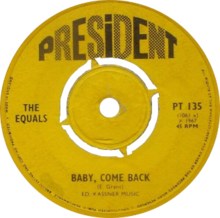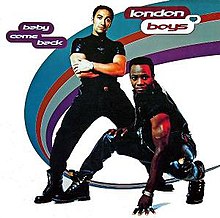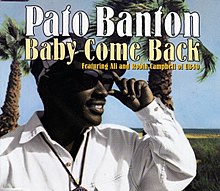Baby, Come Back (The Equals song)
| "Baby, Come Back" | |
|---|---|
 One of side labels of the UK single | |
| Single by the Equals | |
| from the album Unequalled Equals | |
| B-side | "Hold Me Closer" |
| Released | 1967 |
| Genre | |
| Length | 2:37 |
| Label | President[2] |
| Songwriter(s) | Eddy Grant[2] |
| Producer(s) | Ed Kassner[2] |
| Audio | |
| "Baby, Come Back" on YouTube | |
"Baby, Come Back" is a song by English band the Equals from their 1967 album Unequalled Equals. Written by Eddy Grant, the song was originally released as a B-side in 1966 and was later released as a single in continental Europe before being released as a single in the UK in 1968. "Baby, Come Back" charted in multiple countries, including number 1 on the Belgian, Rhodesian and UK charts in 1967 and 1968.
The song has influences from Motown and ska. In the 1990s, Pato Banton and London Boys recorded cover versions of "Baby, Come Back" that were hits in their own right; Banton's version reached number 1 on the UK Singles Chart in 1994.
The Equals version
Background and composition
The Equals were a group from North London, England formed in 1965 whose music was said to fuse pop, blues, ska, and beat.[3]
"Baby, Come Back" has a 4/4 time signature compared to Motown and a beat driven by three guitars. Towards the end of the song, the band beatboxes in the style of ska.[4]
Release
The song was first released in 1966 as a B-side to "Hold Me Closer".[5] However, after impressive sales in the rest of Europe (it reached the top 10 in Belgium and the Netherlands[6]) the song was re-issued in the UK on 1 May 1968 and reached number 1 on the UK Singles Chart for three consecutive weeks beginning 9 July 1968.[7] In all the song stayed in the UK Top 75 for 18 weeks.[7] In the U.S., the song charted at number 32 on the Billboard Hot 100 on 28 September 1968 and was the Equals' only track to chart in the U.S. top 40.[8][9]
Eddy Grant himself released a new version of the song in 1984, 1985 and 1989,[10] without much impact on the charts.
Critical reception
For AllMusic, Steve Leggett called the song "impossibly catchy."[11] In a 2006 review, Freaky Trigger called the song an "excellent pop track that happens to have been made by a mixed-race, mixed-birthplace British-Caribbean band."[4]
In his 2005 book Turn the Beat Around: The Rise and Fall of Disco, Peter Shapiro wrote that "Baby, Come Back" was "a big influence on disco."[12]
Charts
| Chart (1967–68) | Peak position |
|---|---|
| Australia (Go-Set Top 40)[13] | 11 |
| Belgium (Ultratop Flanders)[14] | 1 |
| Belgium (Ultratop Wallonia) | 3 |
| Canada Top Singles (RPM)[15] | 9 |
| France (SNEP)[16] | 2 |
| Ireland (IRMA)[17] | 2 |
| Netherlands (Dutch Top 40)[18] | 6 |
| Netherlands (Single Top 100)[19] | 6 |
| Norway (VG-lista)[20] | 4 |
| Rhodesia (Lyons Maid Hits of the Week)[21] | 1 |
| South Africa (Springbok)[22] | 1 |
| UK Singles (OCC)[23] | 1 |
| US Billboard Hot 100[24] | 32 |
| US Cash Box Top 100[25] | 26 |
| West Germany (Official German Charts[26] | 11 |
Personnel
- Derv Gordon – lead vocals
- Eddy Grant – lead guitar, backing vocals
- Pat Lloyd – rhythm guitar, backing vocals
- Lincoln Gordon – rhythm guitar, bass, backing vocals
- John Hall – drums
London Boys version
| "Baby Come Back" | ||||
|---|---|---|---|---|
 | ||||
| Single by London Boys | ||||
| from the album Love 4 Unity | ||||
| B-side | "Baby Come Back" (Instrumental) | |||
| Released | 1993 | |||
| Genre | ||||
| Length | 3:24 | |||
| Label | EastWest | |||
| Songwriter(s) | Eddy Grant | |||
| Producer(s) | Ralf René Maué | |||
| London Boys singles chronology | ||||
| ||||
In 1993, Europop duo London Boys released their version of "Baby Come Back" as the second single from their third album Love 4 Unity. The single was produced by Ralf René Maué.[27] It was released in Germany and Austria, peaking at number 27 in Austria. This was the last single under the name London Boys. The next and last two were recorded under the name the New London Boys.
Formats and track listings
- 7-inch single
- "Baby Come Back" – 3:24
- "Baby Come Back" (instrumental) – 3:23
- 12-inch single 1
- "Baby Come Back" (Please Come Home extended version) – 6:05
- "Baby Come Back" (Cavallino 12-inch remix Rapino Brothers) – 5:06
- "Baby Come Back" (Affinity Tranceuro remix) – 5:38
- 12-inch single 2
- "Baby Come Back" (Teryiaky with the Rapino Bros club mix) – 6:25
- "Baby Come Back" (Teryiaky instrumental) – 6:28
- "Baby Come Back" (Rapino 12-inch Handbag mix) – 5:20
- "Baby Come Back" (Affinity Tranceuro mix) – 5:40
- CD single 1
- "Baby Come Back" (radio edit) – 3:24
- "Baby Come Back" (Please Come Home mix extended version) – 5:29
- "Baby Come Back" (Cavallino 12-inch remix Rapino Brothers) – 5:06
- "Baby Come Back" (Affinity Tranceuro remix) – 5:38
- "Bob Marley" (Reggae Reggae Rasta Rasta) – 2:10
- CD single 2
- "Baby Come Back" (original version) – 3:24
- "Baby Come Back" (Rapino 7-inch Handbag mix) – 3:25
- "Baby Come Back" (Teryiaky with the Rapino Bros club mix) – 6:25
- "Baby Come Back" (Rapino 12-inch Handbag mix) – 5:20
- "Baby Come Back" (Affinity Tranceuro mix) – 5:40
Personnel
- Edem Ephraim – vocals
- Dennis Fuller – choreographer, backing vocals
- Ralf René Maué – writer, producer
- The Rapino Brothers – remixes
Charts
| Chart (1993) | Peak position |
|---|---|
| Austria (Ö3 Austria Top 40)[28] | 27 |
| Finland (Suomen virallinen lista)[29] | 13 |
Pato Banton featuring Ali and Robin Campbell version
| "Baby Come Back" | ||||
|---|---|---|---|---|
 | ||||
| Single by Pato Banton featuring Ali and Robin Campbell | ||||
| from the album Collections | ||||
| Released | 19 September 1994 | |||
| Genre | Reggae, ska | |||
| Length | 3:55 | |||
| Label | Virgin | |||
| Songwriter(s) | Eddy Grant | |||
| Producer(s) | Susan Stoker, Michael Railton | |||
| Pato Banton singles chronology | ||||
| ||||
"Baby Come Back" was covered by English reggae singer and toaster Pato Banton in 1994, who was joined by Robin and Ali Campbell of UB40. This version was different from the original in that it was in a more conventional, commercial reggae style and Banton added his own verses between the Campbells singing the original hook and chorus. Released in September 1994 by Virgin, the song peaked at number 1 on the UK Singles Chart.
Critical reception
In his weekly UK chart commentary, James Masterton wrote, "The new version is to be honest not half bad with toasting from newcomer Pato Banton and singing supplied by Ali and Robin Campbell from UB40, following Bitty McLean as the second protege they have helped into the charts. Easily a hit then and a possible contender for a Top 10 placing."[30] Alan Jones from Music Week gave it three out of five. He added, "A remake of the old Equal' hit, updated and reggafied by Banton in a jittery ska style, with vocal support from UB40's Campbell brothers Ali and Robin. A happy sound, and a minor hit."[31]
Release and chart performance
Banton's version of "Baby Come Back" was released on 19 September 1994.[32] It entered the UK Singles Chart at number 16, reaching number 1 during its fifth week on the chart, where it stayed for four weeks.[33] It was the fourth-biggest-selling single of 1994 in the UK.[34] In New Zealand, the song entered the chart on 30 October 1994 at number 3, then rose to number 2 the following week, before beginning a four-week reign at number 1 from 13 November to 4 December 1994.[35] According to Virgin Records, about 750,000 copies were sold as of March 1995.[36]
Track listing
- UK CD single
- "Baby Come Back" – 3:52
- "Baby Come Back" (dub) – 6:03
- "Niceness" (live) – 5:40
- "Gwarn!" (new version) – 4:21
Charts
Weekly charts
|
Year-end charts
|
Certifications
| Region | Certification | Certified units/sales |
|---|---|---|
| Australia (ARIA)[59] | Gold | 35,000^ |
| New Zealand (RMNZ)[60] | Platinum | 10,000* |
| United Kingdom (BPI)[61] | Platinum | 600,000^ |
|
* Sales figures based on certification alone. | ||
See also
References
- ^ Stanley, Bob (13 September 2013). "Bubblegum is the Naked Truth: The Monkees". Yeah Yeah Yeah: The Story of Modern Pop. Faber & Faber. p. 275. ISBN 978-0-571-28198-5.
- ^ a b c Rice, Jo (1982). The Guinness Book of 500 Number One Hits (1st ed.). Enfield, Middlesex: Guinness Superlatives Ltd. p. 118. ISBN 0-85112-250-7.
- ^ Bush, John. "The Equals Artist Biography". allmusic. Retrieved 22 March 2021.
- ^ a b Ewing, Tom (20 August 2006). "THE EQUALS – "Baby Come Back"". Freaky Trigger. Archived from the original on 6 October 2008. Retrieved 22 March 2021.
- ^ Davis, Sharon (1997). Every Chart Topper Tells a Story: The Sixties. Edinburgh: Mainstream Publishing. ISBN 1780574169 – via Google Books.
- ^ "De Nederlandse Top 40 - week 7, 1968". Retrieved 11 June 2011.
- ^ a b "Equals: Full Official Chart History". The Official Charts Company. Retrieved 22 March 2021.
- ^ "The Hot 100: Week of September 28, 1968". Billboard. Retrieved 22 March 2021.
- ^ Unterberger, Richie. "First Among Equals: The Greatest Hits – Allmusic Review". allmusic. Retrieved 22 March 2021.
- ^ "Eddy Grant – Baby Come Back at Discogs". Discogs. 1985. Retrieved 11 June 2011.
- ^ Leggett, Steve. "The Very Best of the Equals Allmusic Review". AllMusic. Retrieved 22 March 2021.
- ^ Woodcraft, Molloy (14 August 2005). "When mirrorballs ruled". The Observer. Archived from the original on 14 November 2005. Retrieved 22 March 2021.
- ^ "Baby come back in Australian Chart". Poparchives.com.au. Archived from the original on 29 March 2020. Retrieved 15 June 2013.
- ^ "Baby come back in Belgian Chart". Ultratop and Hung Medien. Archived from the original on 8 November 2012. Retrieved 15 June 2013.
- ^ "Baby come back in Canadian Top Singles Chart". Library and Archives Canada. Retrieved 15 June 2013.
- ^ Hung Medien. "Baby come back in French Chart". Archived from the original on 29 June 2012. Retrieved 15 June 2013. You have to use the index at the top of the page and search "The Equals"
- ^ "Baby come back in Irish Chart". IRMA. Archived from the original on 2 June 2009. Retrieved 15 June 2013. 2nd result when searching "The Equals"
- ^ "Nederlandse Top 40 – week 7, 1968" (in Dutch). Dutch Top 40.
- ^ "The Equals – Baby Come Back" (in Dutch). Single Top 100.
- ^ "The Equals – Baby, Come Back". VG-lista.
- ^ "UKMIX • View topic – Number one hits in Zimbabwe".
- ^ "Springbok SA Top 20". Retrieved 28 February 2018.
- ^ "Official Singles Chart Top 100". Official Charts Company.
- ^ Joel Whitburn's Top Pop Singles 1955–1990 – ISBN 0-89820-089-X
- ^ [1] Archived August 12, 2014, at the Wayback Machine
- ^ "Baby come back in German Chart". Media control. Retrieved 15 June 2013.[dead link]
- ^ "London Boys – Baby Come Back (CD)". Discogs. 1993. Retrieved 12 June 2011.
- ^ "London Boys – Baby Come Back" (in German). Ö3 Austria Top 40.
- ^ Pennanen, Timo (2021). "London Boys". Sisältää hitin - 2. laitos Levyt ja esittäjät Suomen musiikkilistoilla 1.1.1960–30.6.2021 (PDF). Helsinki: Kustannusosakeyhtiö Otava. p. 151. Retrieved 28 July 2023.
- ^ Masterton, James (25 September 1994). "Week Ending October 1st 1994". Chart Watch UK. Retrieved 8 September 2021.
- ^ Jones, Alan (24 September 1994). "Market Preview: Mainstream – Singles" (PDF). Music Week. p. 16. Retrieved 19 April 2021.
- ^ "Single Releases" (PDF). Music Week. 17 September 1994. p. 27. Retrieved 25 June 2021.
- ^ a b "Pato Banton: Artist Chart History". Official Charts Company.
- ^ a b "Top 100 Singles 1994". Music Week. 14 January 1995. p. 9.
- ^ a b "Pato Banton feat. Ali and Robin Campbell – Baby Come Back". Top 40 Singles.
- ^ Pride, Dominic (25 March 1995). "New Deals Boost Warner Chappell U.K." Billboard. Retrieved 22 March 2020.
- ^ "Pato Banton feat. Ali and Robin Campbell – Baby Come Back". ARIA Top 50 Singles.
- ^ "Pato Banton feat. Ali and Robin Campbell – Baby Come Back" (in German). Ö3 Austria Top 40.
- ^ "Pato Banton feat. Ali and Robin Campbell – Baby Come Back" (in Dutch). Ultratop 50. Retrieved 18 November 2019.
- ^ "Eurochart Hot 100 Singles" (PDF). Music & Media. Vol. 11, no. 48. 26 November 1994. p. 15. Retrieved 14 February 2021.
- ^ "Adult Contemporary Europe Top 25" (PDF). Music & Media. 24 December 1994. p. 18. Retrieved 28 May 2023.
- ^ "European Dance Radio Top 25" (PDF). Music & Media. 12 November 1994. p. 30. Retrieved 27 May 2023.
- ^ Pennanen, Timo (2006). Sisältää hitin – levyt ja esittäjät Suomen musiikkilistoilla vuodesta 1972 (in Finnish) (1st ed.). Helsinki: Tammi. ISBN 978-951-1-21053-5.
- ^ "Pato Banton feat. Ali and Robin Campbell – Baby Come Back" (in French). Les classement single.
- ^ "Pato Banton feat. Ali and Robin Campbell – Baby Come Back" (in German). GfK Entertainment charts. Retrieved 18 November 2019.
- ^ "Íslenski Listinn Topp 40 (10.–16.11 '94)". Dagblaðið Vísir (in Icelandic). 10 November 1994. p. 16. Retrieved 18 November 2019.
- ^ "The Irish Charts – Search Results – Baby Come Back". Irish Singles Chart. Retrieved 18 November 2019.
- ^ "Nederlandse Top 40 – week 47, 1994" (in Dutch). Dutch Top 40.
- ^ "Pato Banton feat. Ali and Robin Campbell – Baby Come Back" (in Dutch). Single Top 100. Retrieved 18 November 2019.
- ^ "Official Scottish Singles Sales Chart Top 100". Official Charts Company. Retrieved 18 November 2019.
- ^ "Pato Banton feat. Ali and Robin Campbell – Baby Come Back". Singles Top 100.
- ^ "Pato Banton feat. Ali and Robin Campbell – Baby Come Back". Swiss Singles Chart.
- ^ "Dance Singles" (PDF). Music Week. 15 October 1994. p. 28. Retrieved 26 April 2021.
- ^ "Pato Banton Chart History (Alternative Airplay)". Billboard. Retrieved 18 November 2019.
- ^ "Jaaroverzichten 1994" (in Dutch). Ultratop. Retrieved 18 November 2019.
- ^ "1994 in Review Sales Charts – Eurochart Hot 100 Singles" (PDF). Music & Media. Vol. 11, no. 52. 24 December 1994. p. 12. Retrieved 14 February 2021.
- ^ "Jaaroverzichten – Single 1994" (in Dutch). MegaCharts. Retrieved 18 November 2019.
- ^ "End of Year Charts 1994". Recorded Music NZ. Retrieved 18 November 2019.
- ^ "ARIA Charts – Accreditations – 1994 Singles" (PDF). Australian Recording Industry Association. Retrieved 26 July 2022.
- ^ "New Zealand single certifications – Pato Banton – Baby Come Back". Recorded Music NZ. Retrieved 2024-11-20.
- ^ "British single certifications – Pato Banton – Baby Come Back". British Phonographic Industry. Retrieved 25 June 2021.
